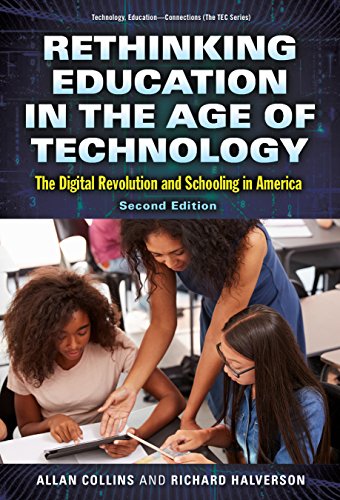Rethinking Education in the Age of Technology: The Digital Revolution and Schooling in America Link to heading
Summary Link to heading
“Rethinking Education in the Age of Technology” by Allan Collins and Richard Halverson explores the transformative impact of digital technology on education systems in America. The book discusses how the proliferation of technology shapes learning environments and the need for educational reform to accommodate these rapidly changing landscapes. The authors examine both the historical evolution of educational practices and the potential future directions catalyzed by digital advancements. They argue for a merging of traditional schooling with modern technological tools to create a more personalized and effective educational experience for students.
Review Link to heading
The book provides a thorough analysis of the intersection between technology and education, offering critical insights into how digital tools can complement traditional learning methods. A significant strength is the balanced perspective it offers—highlighting both the opportunities and challenges posed by the digital revolution in education. The authors effectively use historical context to underscore their arguments, providing a comprehensive overview of the need for educational change. One critique could be that the book may overemphasize technology’s potential benefits without fully addressing the socioeconomic disparities that could affect its implementation. Nonetheless, it is a thought-provoking read for educators, policymakers, and anyone interested in the future of education.
Key Takeaways Link to heading
- Adaptation to Technology: Educational institutions need to integrate digital technology to meet the needs of contemporary learners effectively.
- Personalized Learning: Technology offers tools that can help tailor education to individual student needs, potentially increasing engagement and learning outcomes.
- Educational Reform: There is an urgent need for systemic reform that incorporates technological advancements into the core curriculum and teaching models.
- Lifelong Learning: Technology challenges the traditional view of education as a phase limited to one’s early years, encouraging lifelong learning opportunities.
- Equity Concerns: Despite the potential of technology, issues surrounding access and equity remain significant and must be addressed for inclusive educational reform.
Recommendation Link to heading
This book is highly recommended for educators, administrators, policymakers, and educational researchers who are interested in understanding how technology is reshaping education. It offers critical insights for those involved in curriculum development and strategic planning within educational institutions. Those interested in the future of learning in the digital age will find this book valuable for its comprehensive analysis and forward-thinking perspectives.
